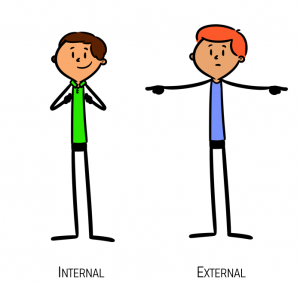Perhaps you know of someone who considers that most things that happen are caused by chance. Or they seem to accept that whatever significant events occur in their life, it was fate or luck that determined the outcome.
On the other hand, some people clearly believe that they control their own destiny. Their belief is that whatever happens to them is mostly due to the choices they make or the actions they take.
These disparate belief systems represent opposite ends of a continuum that social scientists refer to as Locus of Control. A person’s Locus of Control is where someone places the primary causation of events in his life. Those who believe their life is largely controlled by outside forces (externals) are on one end of the spectrum. Those who believe they control their own lives (internals) are on the other end of the spectrum.
Locus of Control is a psychological construct. This simply means that it is an instrument that can be used to describe a group of attitudes or behaviors.
Julian Rotter is credited with introducing the concept of Locus of Control. He based much of his research on the work of Albert Bandura, who developed social learning theory. In his seminal paper published in 1966, Rotter explains that people can interpret events as being either a result of one’s own actions or external factors. Rotter developed a scale to assess whether a person has a tendency to think that situations and events are under their own control (internal influences) or under the control of someone or something beyond their control (external influences).
Listed below are a few of the paired statements from the original Rotter Internal-External Locus of Control Scale:
1a. Becoming a success is a matter of hard work; luck has little or nothing to do with it.
1b. Getting a good job depends mainly on being in the right place at the right time.
2a. Many of the unhappy things in people’s lives are partly due to bad luck.
2b. People’s misfortunes result from the mistakes they make.
3a. One of the major reasons why we have wars is because people don’t take enough interest in politics.
3b. There will always be wars, no matter how hard people try to prevent them.
5a. Many times I feel that I have little influence over the things that happen to me.
5b. It is impossible for me to believe that chance or luck plays an important role in my life.
4a. In the long run, people get the respect they deserve in this world.
4b. An individual’s worth often passes unrecognized no matter how hard he tries.
Since Rotter’s original work, many other researchers have studied Locus of Control, often seeking to determine if it can be used to predict outcomes in more targeted domains. Here are a few examples of Locus of Control scales that were developed for specific purposes:
• The Multidimensional Health Locus of Control Scale is used to assess an individual’s belief in what influences their health.
• The Drinking Locus of Control Scale is focused on alcoholics and those who regularly consume alcohol to assess whether the person believes they can control their drinking.
• The Headache Specific Locus of Control Scale targets chronic headache sufferers and whether they seek treatment or not.
• The Parental Health Belief Scales are used to assess the extent to which a parent believes they have control over their child’s health.
• The Economic Locus of Control Scale is used to assess an individual’s belief in how much control they have over the work and money-related aspects of their lives.
• The Traffic Locus of Control Scale was developed to investigate possible links between driver Locus of Control and risky or unsafe driving behavior.
John Jones and Lisa Wuebker co-developed the Safety Locus of Control Scale. Let’s describe some of their research and summarize the important findings. Continue Reading


